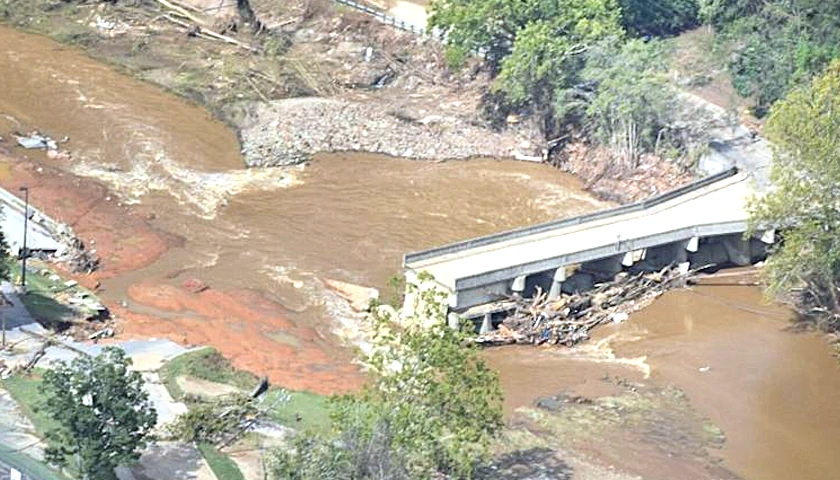by Alan Wooten
Six hundred people are unaccounted for, and one of North Carolina’s hardest-hit counties by the remnants of Hurricane Helene on Monday said at least 35 have died.
Six states total at least 121 fatalities, many places in the Blue Ridge Mountains have yet to be checked because of failed infrastructure, and critical aid is being rushed to survivors of historic flooding. Buncombe County, where Asheville is county seat, had withheld a fatality number pending notification of kin, a protocol made more troublesome by lack of power, internet and cellphones in many big pockets throughout the region.
Twenty-five years to the month after people in the mountains of the state and elsewhere sent resources to eastern North Carolina for the 500-year flood caused by Hurricane Floyd, convoys of bottled water, cleaning supplies and necessities were heading west. AccuWeather recorded more than 30 inches of rain in two locations and estimated damage between $145 billion to $160 billion, up from weekend estimates by others of $95 billion to $110 billion.
#HeleneNC Mission of the Day:
Aviation assets continue to fly across western North Carolina to inform NCDOT response. While flying missions on I-40, UAS teams pilots discovered and documented damage to structures in McDowell County. pic.twitter.com/cdWfDH4Wbw
— Division of Aviation (@NCAviation) September 30, 2024
South Carolina and Georgia each lost 25 lives, and Florida 11, according to published reports.
Asheville has been like many other locales along North Carolina’s stretch of the Appalachian Mountains – only reachable by air. At 4 p.m. Eastern on Monday, DriveNC.org reported 432 total road closures due to Helene – nine interstates, 25 federal highways, 42 state highways, and 356 secondary roads.
More than 150 have been cleared since the storm began, U.S. Rep. Chuck Edwards, R-N.C., said in a release. He also shared that his district – the southern-most part of the mountain range bordering Tennessee, Georgia and South Carolina – should have most of its service from Duke Energy operable by Friday.
More than 600 National Guardsmen have been deployed to western North Carolina, their mission bolstered by high-water vehicles, palletized load systems and forestry support teams for debris clearance. They were expected Monday.
Our day has been bustling with UAS, Civil Air Patrol, and NCDOT photogrammetry plane missions, showcasing the diversity of resources at our disposal. Huge thank you to our pilots and crews who continue to tackle numerous missions. pic.twitter.com/Bj2vJUaWy1
— Division of Aviation (@NCAviation) September 29, 2024
AccuWeather said rainfall totals were 32.51 inches in Jeter Mountain, 31.36 inches in Busick, and 26.65 inches in Hughes. From Asheville, Jeter Mountain is about 40 miles due south not far from South Carolina, Busick is about 40 miles northeast just off the Pisgah National Forest, Hughes about 70 miles northeast near Sugar Mountain.
Gov. Roy Cooper said he expects, as crews reach more areas that are yet to be accessed, the fatalities total will rise. White House Homeland Security Adviser Liz Sherwood-Randall said Monday, “It looks like there could be as many as 600 lost lives. We know there are 600 who are either lost or unaccounted for.”
President Joe Biden, before departing Dover Air Force Base aboard Air Force One, on Monday said, “It really is amazing. You saw the photographs. It’s stunning.”
The 81-year-old, besieged from the public by health questions halting his attempt for reelection on July 21, said he would visit the North Carolina areas when safe and not an intrusion on recovery and relief efforts.
Vice President Kamala Harris, No. 2 in charge of his incumbent administration, changed her campaign plans so she could visit the Southeast this week, newswire Reuters said.
The images Biden referred to have blitzed the internet many in the region can’t access. Some structures floated off foundations and went down roads in whole; others were torn apart by the downhill rapids, splintered and spread as if dropped by a tornado. In published reports, residents were aghast at the magnitude and offered “never seen anything like it” over and over.
They would have had to remember July 1916, when six straight days of rain started July 5. It was associated with a hurricane coming out of the Gulf of Mexico that weaved from the Mississippi-Alabama line to eastern Tennessee, and a second one that made landfall in Charleston, S.C., on July 14.
Asheville, at 94,589 easily the largest city in the state west of Winston-Salem near the Virginia border and Charlotte toward South Carolina, has a city water system damaged and has been cordoned by a mudslide blocking Interstate 40. Going west, I-40 is closed because two eastbound lanes fell into the Pigeon River along a mountainside about 4 miles from Tennessee.
– – –
Alan Wooten is a managing editor at The Center Square.





